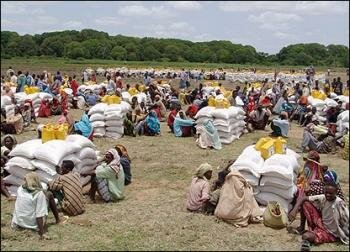UN: Half Somali population needs humanitarian aid
 MOGADISHU, Somalia is facing its worst humanitarian crisis in 18 years, with more than half of the population needing humanitarian aid amid an escalating crisis, the U.N. said Tuesday.
MOGADISHU, Somalia is facing its worst humanitarian crisis in 18 years, with more than half of the population needing humanitarian aid amid an escalating crisis, the U.N. said Tuesday.
The agency’s Food Security and Nutrition Analysis Unit said Tuesday that 3.76 million people are getting humanitarian assistance and warned of further deterioration because of the country’s ongoing insurgency.
“This signals a serious deterioration in the emergency food security and nutrition situation from earlier this year,” said Cindy Holleman, the Chief Technical Adviser of the Somalia FSNAU.
Somalia has been ravaged by violence and anarchy since warlords overthrew dictator Mohamed Siad Barre in 1991, then turned on each other. The al-Shabab insurgent group, which has foreign fighters in its ranks, operates openly in the capital and seeks to overthrow the government and impose a strict form of Islam in Somalia.
Many experts fear the country’s lawlessness could provide a haven for al-Qaida, offering a place for terrorists to train and gather strength – much like Afghanistan in the 1990s. The United States accuses al-Shabab of having ties to the terror network, which al-Shabab denies.
Insurgents have been threatening to increase attacks during Ramadan, a monthlong period of prayer, reflection and sunrise-to-sunset fasts. But the top U.N. envoy for Somalia, Ahmedou Ould Abdallah, urged Somalis to unify during the holy month, which began Saturday.
“I particularly appeal to the Somali elite, inside and outside the country, who are fortunate enough to live with their families in comfortable, secure homes and with access to good schools to remember that only stability will end the long suffering of refugees and internally displaced persons,” he said. “It will also help you to have, once again, a place to call proudly homeland.”
Sheik Sharif Sheik Ahmed, a moderate Islamist, was elected president in January in hopes that he could unite the country’s feuding factions, but the violence has continued. And as of June 30, the AU force in Mogadishu had 4,300 troops, from Uganda and Burundi, just 54 percent of its authorized strength of 8,000.
Various Islamist groups have been fighting the U.N.-backed government since being chased from power 2 1/2 years ago. The situation is complicated by the continual splintering and reforming of alliances and a tangled web of clan loyalties.
Source: Global Arab Network
By MOHAMED OLAD HASSAN
Photo: Displaced Somalis.
Comments
comments
 Calendar
Calendar






































